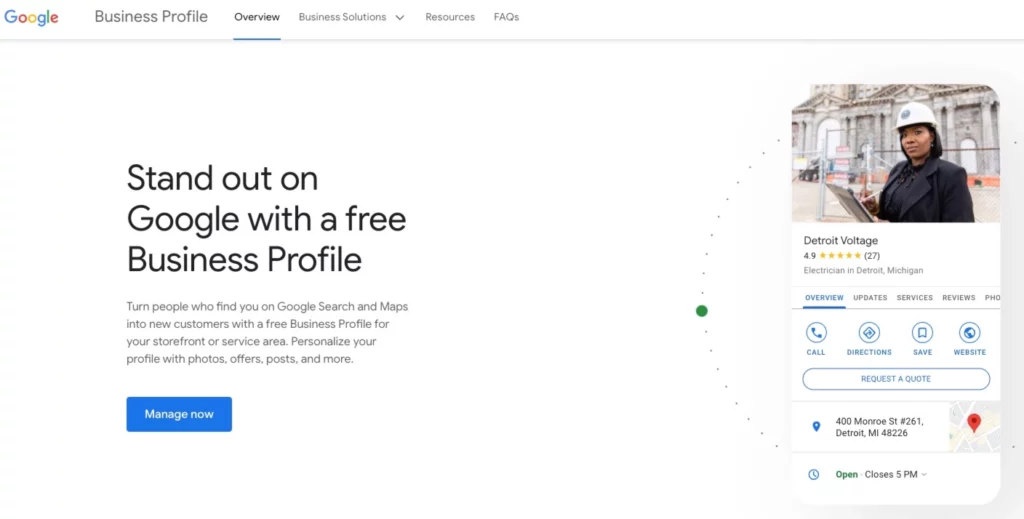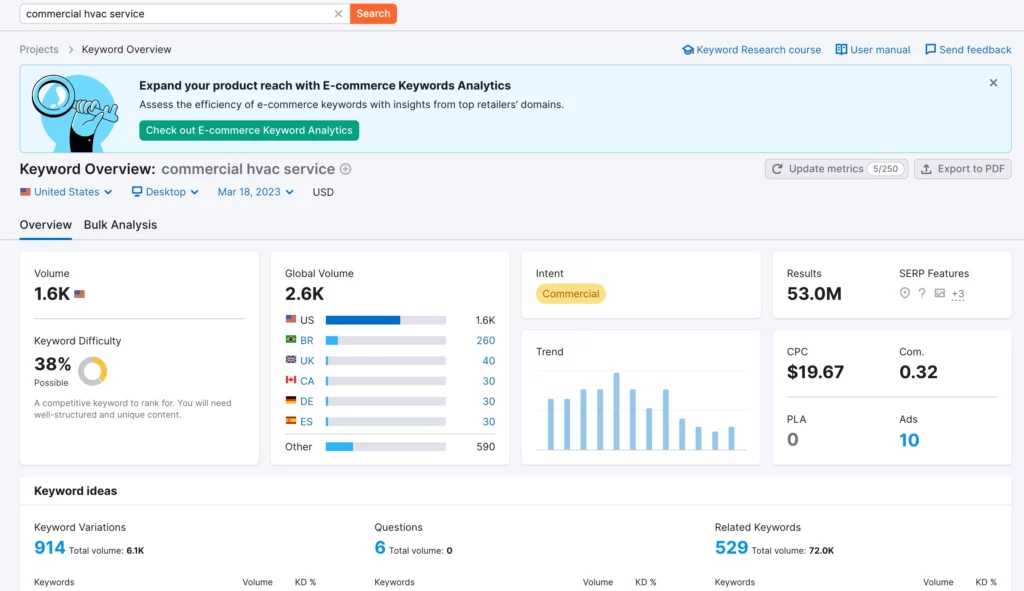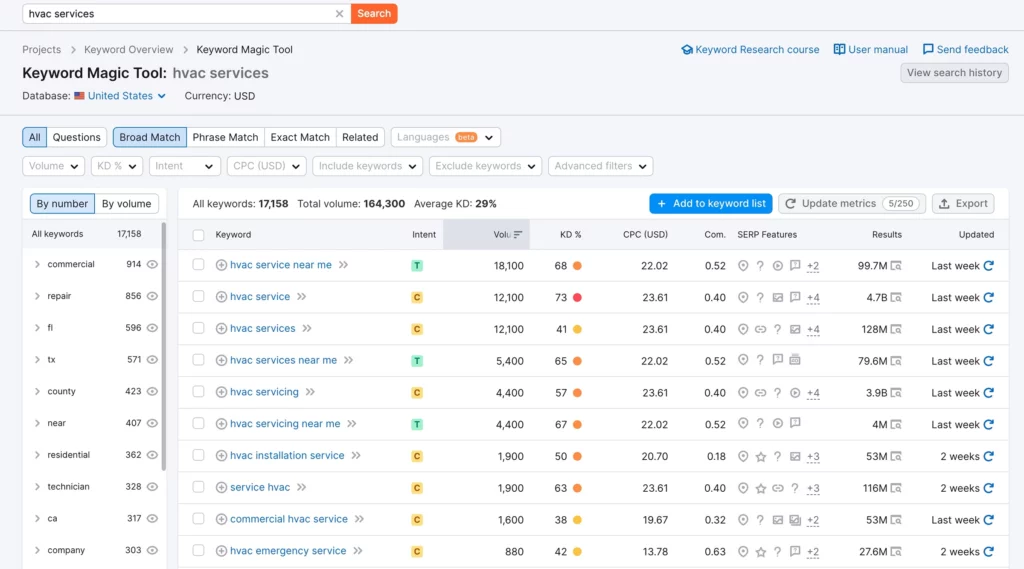If you’re an HVAC contractor looking to boost your online visibility, one strategy you should consider is SEO for HVAC contractors. It’s a powerful tool to attract more customers to your business.
What is SEO?
Simply put, SEO (search engine optimization) is the practice of optimizing your website and online presence to rank higher in search engine results pages (SERPs) for relevant keywords and phrases. The higher your website ranks, the more visible it will be to potential customers who are searching for HVAC services online.
HVAC Search Engine Optimization
HVAC search engine optimization is a specific type of SEO that is tailored to the HVAC industry. It involves using strategies and techniques that are specifically designed to improve the online visibility and search rankings of HVAC contractors.
The Importance of SEO for HVAC Contractors
In today’s digital age, more and more people are turning to the internet to find local businesses and services. This means that having a strong online presence is essential for any HVAC contractor who wants to compete and succeed in their local market.
By implementing effective SEO strategies, you can improve your website’s search rankings and attract more traffic to your site, ultimately leading to more leads and customers for your business.
Understanding Local SEO for HVAC Contractors
Local SEO is a subset of SEO that focuses on improving your website’s visibility and rankings for local search results. This means that when potential customers search for HVAC services in your local area, your website will appear higher in the search results, making it more likely that they will click on your site and contact your business.
Benefits of Local SEO for HVAC Contractors
Implementing effective local SEO strategies can offer several benefits for HVAC contractors, including:
- Increased visibility in local search results
- Improved search rankings for relevant local keywords and phrases
- Increased website traffic from local customers
- Higher conversion rates, as local customers are more likely to convert into leads and customers
- Improved online reputation through positive customer reviews and ratings
Tips for Local SEO for HVAC Contractors
Here are some key tips to help HVAC contractors improve their local SEO:
- Optimize your Google My Business (GMB) listing: This is a critical step in local SEO. Ensure that your GMB profile is complete and accurate, including your business name, address, phone number, website, hours of operation, and photos.
- Use local keywords on your website: Use relevant local keywords and phrases throughout your website, including in your page titles, meta descriptions, content, and URLs.
- Build local citations: Citations are mentions of your business name, address, and phone number (NAP) on other websites. Building local citations can help improve your local SEO and increase your visibility in local search results.
- Get customer reviews: Positive reviews from satisfied customers can improve your online reputation and boost your rankings in local search results. Encourage happy customers to leave reviews on your GMB listing or other review sites.
- Use location-specific content: Create content that is specific to your local areas, such as blog posts about local events or news in the HVAC industry. This can help establish your business as a local authority and improve your local search rankings.
Best SEO Strategies for HVAC Contractors
To improve your website’s search rankings and visibility, it’s important to implement effective SEO strategies. Here are some of the best strategies for SEO for HVAC contractors:
On-Page SEO Strategies
On-page SEO strategies involve optimizing the content and structure of your website. Here are three key on-page SEO strategies to focus on:
- Keyword research: Conducting thorough keyword research can help you identify the keywords and phrases that your target audience is using to search for HVAC services online. Use these keywords throughout your website’s content, including in your titles, meta descriptions, headers, and body text. Below we will get into the specifics about this!
- Website optimization: Optimizing your website for search engines involves ensuring that your website is mobile-friendly, has a fast page load speed, and is easy to navigate. Search engines prefer websites that offer a positive user experience, so it’s important to make sure your website is user-friendly.
- Content creation and optimization: Creating high-quality, informative content that addresses the needs and concerns of your target audience can help improve your website’s search rankings. Be sure to optimize your content with relevant keywords and phrases, and include images, videos, and other multimedia elements to make your content more engaging.
Off-Page SEO Strategies
Off-page SEO strategies involve building external links and promoting your website through social media and other channels. Here are three key off-page SEO strategies to focus on:
- Link building: Building high-quality, relevant links from other websites to your website can help improve your website’s search rankings. Focus on building links from authoritative websites in the HVAC industry, such as industry associations, trade publications, and reputable blogs.
- Social media marketing: Social media can be a powerful tool for promoting your website and building your online presence. Use social media platforms like Facebook, Twitter, and LinkedIn to share your content, engage with your audience, and promote your services.
- Online directories: Listing your business in online directories like Yelp, Angie’s List, and HomeAdvisor can help improve your website’s visibility and search rankings. Be sure to keep your directory listings up-to-date with accurate business information and customer reviews.
Writing Effective Blog Posts for HVAC SEO
Blogging is an effective way for HVAC contractors to establish their expertise and attract potential customers through search engine optimization (SEO). Here are some tips for creating effective blog posts that improve your website’s search rankings:
Importance of Blogging for HVAC Contractors
Blogging is a powerful tool for HVAC contractors to demonstrate their expertise, educate their audience, and attract potential customers.
Consistently creating and publishing informative, high-quality blog content can help establish your business as a thought leader in the industry and improve your website’s search rankings.
Tips for Creating Effective Blog Posts
To make the most of your blog content for SEO purposes, here are six key tips to keep in mind:
#1. Choose relevant topics:
Choose blog topics that are relevant to your target audience and the services you offer. Use keyword research to identify the topics and phrases that your target audience is searching for.
#2. Use keyword-rich titles and meta descriptions:
Use relevant keywords and phrases in your blog post titles and meta descriptions. This helps search engines understand what your blog post is about and can improve your search rankings.
#3. Optimize blog content for readability and SEO:
Make sure your blog content is easy to read and engaging for your audience. Use subheadings, bullet points, and other formatting techniques to break up your content and make it more scannable. Also, be sure to optimize your content with relevant keywords and phrases.
#4. Write short sentences and short paragraphs:
Short sentences can help break up content into easily digestible pieces, making it more engaging for readers and easier for search engines to crawl through. Short paragraphs also keep readers focused on specific points, helping them quickly understand the message you’re trying to convey.
#5. Include internal and external links:
Linking to other pages on your website (internal links) and to other relevant websites (external links) can help improve your website’s search rankings. Internal links help search engines understand the structure and hierarchy of your website, while external links help establish your website’s authority.
#6. Promote blog content through social media and other channels:
Promoting your blog content through social media, email newsletters, and other channels can help increase your website’s traffic and visibility. Be sure to share your blog posts on your social media profiles and encourage your audience to engage with and share your content.
Keyword Research for SEO for HVAC Contractors
Keyword research is a crucial aspect of SEO for HVAC contractors. It involves identifying the specific words and phrases that potential customers use to search for HVAC services online.
By understanding the keywords and phrases that your target audience is using, you can optimize your website and content to improve your visibility and attract more traffic to your site. Here’s what you need to know about keyword research for HVAC contractors:
Why Keyword Research is Important for HVAC Contractors
Keyword research is important for HVAC contractors because it helps you understand the language and terminology that potential customers use when searching for HVAC services online.
By incorporating these keywords and phrases into your website and content, you can improve your website’s search rankings and attract more traffic from potential customers who are actively searching for HVAC services online.
Long-Tail Keywords for HVAC Contractors
Long-tail keywords are specific, niche phrases that are longer and more detailed than general keywords. They can be particularly useful for HVAC contractors. They can help you target specific types of customers who are looking for specific HVAC services.
For example, instead of targeting the broad keyword “HVAC services”, you could target a more specific long-tail keyword like “emergency furnace repair in [city name]”. By targeting specific long-tail keywords, you can attract more qualified leads and increase your chances of converting them into customers.
How to Do Keyword Research for HVAC Contractors
Here’s a step-by-step guide to conducting keyword research for HVAC contractors:
- Brainstorm keywords: Start by brainstorming a list of potential keywords and phrases that your target audience might use when searching for HVAC services. Think about the specific services you offer, the problems your customers are trying to solve, and the benefits of your services.
- Use keyword research tools: There are several keyword research tools available that can help you identify relevant keywords and phrases. Some popular tools include Google Keyword Planner, SEMrush, and Ahrefs. These tools can help you identify the search volume and competitiveness of specific keywords. They also provide related keywords and phrases that you might not have thought of.
- Analyze competitor keywords: Look at the websites and content of your competitors to see what keywords and phrases they are targeting. This can give you ideas for keywords to target and help you identify gaps in your own keyword strategy.
- Group keywords by topic: Once you have a list of keywords, group them into topics based on their relevance and similarity. This will help you organize your content and optimize your website for specific topics and themes.
- Create content around keywords: Use your keyword research to inform your content strategy. Create blog posts, web pages, and other content that targets specific keywords and phrases. Be sure to optimize your content with relevant keywords in your titles, meta descriptions, headers, and body text.
Here are some example keywords and phrases that HVAC contractors might target:
- HVAC services
- Heating repair
- Air conditioning installation
- Furnace maintenance
- Emergency HVAC services
- Duct cleaning
- Indoor air quality
- Energy-efficient HVAC solutions
- HVAC financing options
- HVAC contractors in [city name]
- HVAC repair near me
- Best HVAC companies in [city name]
Long-tail keyword examples for HVAC contractors:
- Emergency furnace repair in [city name]
- Best air conditioning installation companies near me
- Duct cleaning services for commercial buildings
- Energy-efficient HVAC solutions for small businesses
- Indoor air quality testing for homes
- Affordable HVAC financing options for homeowners
- 24-hour HVAC repair services in [city name]
- Smart thermostat installation for residential properties
- Geothermal HVAC installation for eco-friendly homes
- Central air conditioning repair for multi-story buildings
Measuring and Monitoring HVAC SEO Performance
After implementing SEO strategies for your HVAC business, it’s important to measure and monitor your SEO performance to ensure that your efforts are delivering the desired results.
Here are some key points to keep in mind when measuring and monitoring your HVAC SEO performance:
Importance of Measuring and Monitoring SEO Performance
Measuring and monitoring your HVAC SEO performance is crucial to understanding the effectiveness of your SEO strategies and identifying areas for improvement.
Without measuring your SEO performance, it’s difficult to know whether your efforts are generating the desired results, or whether you need to adjust your strategies to improve your search rankings and visibility.
Tools for Measuring SEO Performance
There are several tools available that can help you measure and monitor your HVAC SEO performance. Some popular tools include:
- Google Analytics: Google Analytics is a free tool that provides detailed insights into your website’s traffic and user behavior. You can use Google Analytics to track key metrics like website traffic, bounce rates, and conversion rates.
- Google Search Console: Google Search Console is a free tool that provides insights into your website’s search performance, including your search rankings, click-through rates, and impressions.
- SEMrush: SEMrush is a paid tool that provides a comprehensive suite of SEO tools, including keyword research, site audit, backlink analysis, and competitor analysis.
Key Metrics to Track
When measuring and monitoring your HVAC SEO performance, there are several key metrics to track. Here are some of the most important metrics to monitor:
- Website traffic: Keep track of your website’s traffic and how it changes over time. Look for trends and changes that could indicate an issue with your SEO strategies.
- Search rankings: Monitor your search rankings for relevant keywords and phrases. Keep track of any changes in your rankings and adjust your strategies accordingly.
- Click-through rates (CTRs): CTRs measure the percentage of users who click on your website’s link in search results. Keep an eye on your CTRs to ensure that your titles and meta descriptions are effective at enticing users to click on your links.
- Bounce rates: Bounce rates measure the percentage of users who leave your website after viewing only one page. A high bounce rate could indicate that your website is not meeting the needs and expectations of your target audience.
- Conversion rates: Conversion rates measure the percentage of users who take a desired action on your website, such as filling out a contact form or making a purchase. Tracking your conversion rates can help you understand the effectiveness of your SEO strategies in generating leads and sales.
Final Thoughts and Conclusion on SEO for HVAC Contractors
In today’s digital age, SEO for HVAC contractors is more important than ever. By implementing effective SEO strategies, you can improve your website’s search rankings and visibility, attract more traffic to your site, generate more leads, and ultimately grow your business. Here’s a recap of the key takeaways from this article:
- HVAC search engine optimization involves optimizing your website and online presence to improve your rankings in search engine results pages (SERPs) for relevant keywords and phrases.
- Local SEO is a subset of SEO that focuses on improving your website’s visibility and rankings for local search results.
- Effective SEO strategies for HVAC contractors include on-page strategies like keyword research, website optimization, and content creation, as well as off-page strategies like link building and social media marketing.
- Writing effective blog posts can be a powerful tool for improving your HVAC SEO performance, by attracting potential customers through informative and engaging content.
- Measuring and monitoring your HVAC SEO performance is crucial to understanding the effectiveness of your strategies and identifying areas for improvement.
To improve your HVAC SEO performance, here are some final tips and recommendations:
- Conduct thorough keyword research to identify relevant keywords and phrases that your target audience is searching for.
- Focus on creating high-quality, informative content that addresses the needs and concerns of your target audience.
- Optimize your website and content for search engines by using relevant keywords and phrases in your titles, meta descriptions, headers, and body text.
- Build high-quality, relevant links from other websites to your website.
- Use social media to promote your website and content and engage with your target audience.
- Monitor your website’s traffic, search rankings, and other key metrics to track the effectiveness of your SEO strategies and identify areas for improvement.





